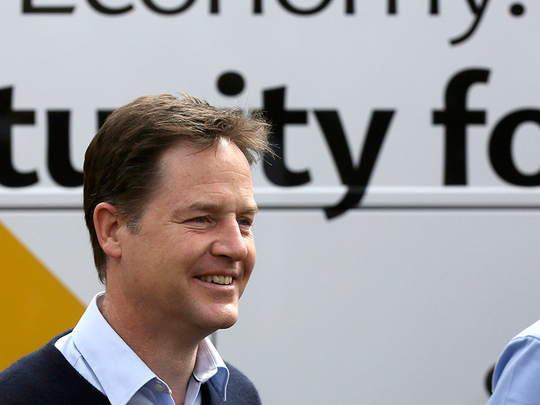
London: Just before the leader of Britain’s Liberal Democrats, Nick Clegg, entered government with the Conservatives in 2010, Angela Merkel is said to have remarked that, in coalitions: “The little party always gets smashed.”
The deputy prime minister’s experience has borne that out and polls suggest that he and his party are now so unpopular that he could lose his seat at the May 7 election, ending his front line political career.
Many voters see Clegg, 48, as weak and blame the centrist Liberal Democrats for propping up Prime Minister David Cameron’s Conservative-led administration as it introduced tough austerity measures.
Clegg has been seen as shielding Cameron from excessive criticism, while a focus group run by a leading pollster last month compared him to a chihuahua in a handbag.
Clegg argues that the Liberal Democrats have taken the edge off coalition austerity policies by “anchoring the government in the centre ground” and in recent months he has tried to distance himself from the Conservatives.
But his party’s support has dropped by over two-thirds since 2010 and they look likely to lose around half of their 56 House of Commons seats at next month’s election.
In the often insular world of British politics, Clegg’s cosmopolitan background stands out.
Born to a half-Russian merchant banker father and a Dutch mother, he speaks English, Dutch, French, Spanish and German.
He is married to Miriam Gonzalez Durantez, a Spanish lawyer whose salary is thought to dwarf his. The couple have three young sons.
Clegg was educated at prestigious Westminster School, where contemporaries included actress Helena Bonham Carter, and later studied at Cambridge University and in the United States and Belgium.
From 1994, he worked at the European Commission and later became an adviser to Britain’s trade commissioner Leon Brittan, a former Conservative minister.
Clegg was elected a member of the European Parliament in 1999 and to the House of Commons in 2005, becoming his party’s leader two years later.
He shot to mainstream prominence during the 2010 election campaign thanks to a strong performance in TV debates with other party leaders, prompting an outbreak of what the media dubbed “Cleggmania”.
The Conservatives did not win enough seats to govern alone in 2010 so they teamed up with the Liberal Democrats to form Britain’s first coalition government since Secon World War. This also gave the smaller party their first taste of power.
In a chummy press conference in the rose garden at 10 Downing Street, Clegg and Cameron proclaimed “a new kind of government” and vowed to end adversarial politics.
But while the prime minister and his deputy — who share similar privileged backgrounds and a love of tennis — got along better than expected, voters soon turned on Clegg and his party as they were forced to compromise in government.
Most damaging was the coalition breaking a Liberal Democrat campaign promise not to raise university tuition fees.
This prompted thousands of students to join sometimes violent protests in London six months after the election.
Dogged by the issue, Clegg apologised in 2012 but the footage was swiftly remixed into a YouTube parody song and went viral.
Clegg has defended his party’s record in government, saying its loss of popularity is the inevitable price of hard spending choices made in the wake of the 2008 financial crisis.
The figures are stark — a BBC opinion poll tracker currently gives the Liberal Democrats eight per cent support, down from a 23 per cent share of the vote in 2010.
Despite such statistics, Clegg has not ruled out another Liberal Democrat coalition with the Conservatives or the main opposition Labour after May’s election.
But if he fails even to hold his own seat in the northern English city of Sheffield, that would be a question for their new leader.












